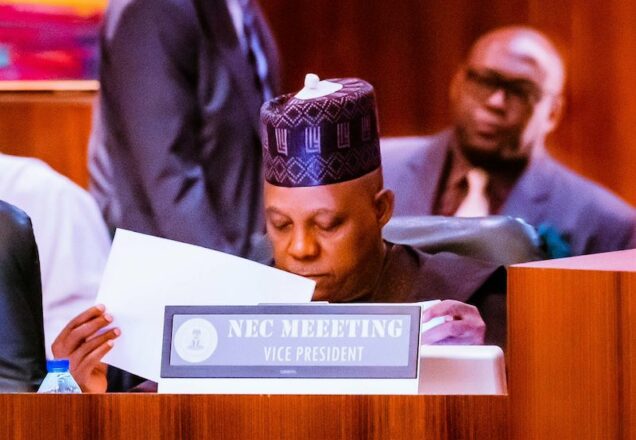Nigeria News
Details Of 137th NEC Meeting Presided By Shettima Emerge

Vice President Kashim Shettima has implored the Governors of the 36 states of the federation to work towards revamping Nigeria’s agricultural sector to reduce dependence on food imports and attain greater food self-sufficiency.
Shettima gave the charge on Thursday during the 137th National Economic Council (NEC) meeting held at the Council Chamber of the Presidential Villa, Abuja.
He stated that the advice resonates well with the investments and commitment of the African Development Bank to establishing Specialised Agro Processing Zones (SAPZ) in the country.
While delivering his opening address at the meeting, Shettima said, “Our upcoming task must be rooted in recognizing the agrarian nature of our economy. We must strive for deliberate value addition in the agricultural sector, moving away from commodity exports towards job creation.
“Collaboration is vital in enabling the Specialized Agro Processing Zones (SAPZ) Programme spearheaded by the Ministry of Agriculture and Rural Development in partnership with the Africa Development Bank (@AfDB_Group).
“Your Excellencies, we must develop our agricultural sector towards self-sufficiency and export processed agricultural products in line with the African Union’s Africa 2063 Agenda. This also aligns with AfDB’s investments and commitment to establishing the SAPZ. Collaboratively, we should harness our agricultural comparative and complementary advantages across the value chains of priority crops within the SAPZ.”
The vice president also hinted at the possibility of engaging the private sector in tackling floods and other natural disasters, saying that considering the financial implications of managing natural disasters, the government cannot do it alone.
He continued: “While urging unity as the nation’s hope, I am aware of the financial implications of managing natural disasters. We cannot tackle this alone. Innovative capital pools from the private sector can help share and mitigate fiscal and economic risks posed by such disasters. This approach has been successful in other African countries, preparing for low-probability yet highly disruptive ‘black swan’ events.
“Once again, we find ourselves bearing the weight of the nation. Since our last gathering, much has transpired, with each event punctuated by the nation’s reactions. None of us here requires a reminder of the direction we are headed or what is required to ensure that we stand together through the storm to fulfil our promises to the people. It gives me great pleasure to welcome you back, back to the 137th meeting of the National Economic Council, our engine room”.
Recalling that President Bola Tinubu had recently highlighted eight presidential priorities for his administration, which serve as a conduit to his Renewed Hope Agenda, Shettima told the Governors and other members of the Council to get “involved in seeking both short-term palliative and enduring solutions to the consequences of our reforms.”
Meanwhile, other highlights of the meeting are as follows:
Update on ECA
1. Excess crude account (ECA) as of September,
$473,754.57
2. Stabilization as of September,2023
#37,597,965,211.43
3. Current Balance of Natural Resources
#144,683,136,928.25
4. Presentation of the Committee’s report on flood mitigation, adaptation, preparedness, and response by Governor Yahaya Bello of Kogi State.
5. PRESENTATION ON NATIONAL CATASTROPHE INSURANCE
6. PRESENTATION ON NIGERIA’S HEALTH SECTOR RENEWAL PROGRAMME BY THE COORDINATING MINISTER OF HEALTH AND SOCIAL WELFARE
7. PRESENTATION ON THE SPECIAL AGRO-INDUSTRIAL PROCESSING ZONE (SAPZ) PROGRAMME BY SENATOR ABUBAKAR KYARI, MINISTER OF AGRICULTURE AND FOOD SECURITY
8. PRESENTATION ON STATE BUDGET SUPPORT FACILITY AS OF 30TH NOVEMBER, 2023 FAAC MEETING BY OFFICE OF THE ACCOUNTANT GENERAL OF THE FEDERATION












